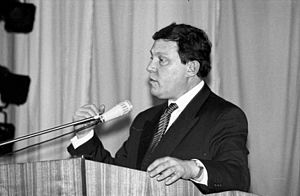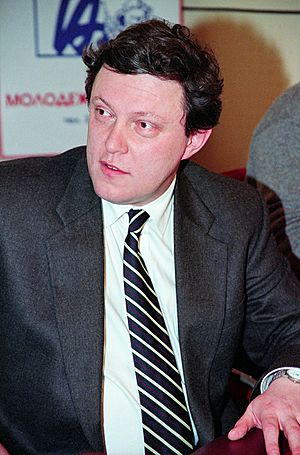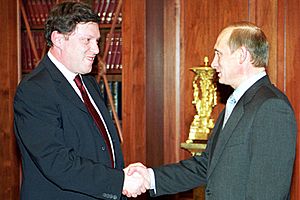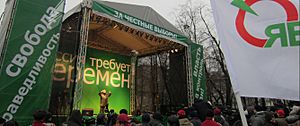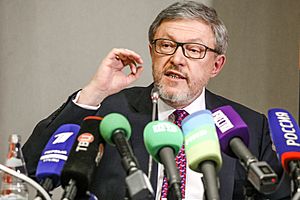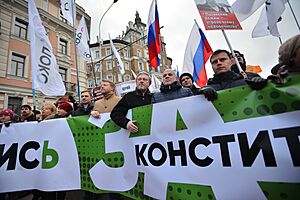Grigory Yavlinsky facts for kids
Quick facts for kids
Grigory Yavlinsky
|
|
|---|---|
|
Григорий Явлинский
|
|
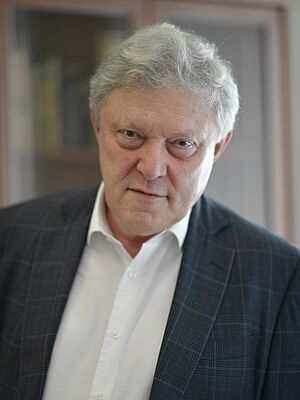
Yavlinsky in 2023
|
|
| Leader of Yabloko | |
| In office 1993–2008 |
|
| Preceded by | office established |
| Succeeded by | Sergey Mitrokhin |
| Member of the State Duma | |
| In office 11 January 1994 – 19 December 2003 |
|
| Deputy Premier of the Soviet Union as Deputy Chair of the Economic Operational Management Committee |
|
| In office 24 August 1991 – 25 December 1991 Serving with Yury Luzhkov and Arkady Volsky
|
|
| Premier | Ivan Silayev |
| Preceded by | office established |
| Succeeded by | office abolished |
| Deputy Premier of the Russian SFSR | |
| In office 14 June 1990 – 22 November 1990 Serving with others
|
|
| Premier | Ivan Silayev |
| Personal details | |
| Born | 10 April 1952 Lviv, Ukrainian SSR, Soviet Union (now Ukraine) |
| Nationality | Russian |
| Political party | Yabloko |
| Spouse | Elena Yavlinskaya (b. 1951) |
| Children | Mikhail (b. 1971) Aleksey (b. 1981) |
| Signature |  |
| Website | http://yavlinsky.ru/ |
Grigory Alekseyevich Yavlinsky (born 10 April 1952) is a well-known Russian economist and politician. He has worked in various government roles in both the Soviet Union and Russia, including serving in the State Duma, which is like Russia's parliament.
Yavlinsky helped create the "500 Days Program," a plan to change the Soviet Union's economy from government-controlled to a free market. He also led the opposition party called Yabloko. He has run for president of Russia three times. In 1996, he came in fourth place. In 2000, he finished third. In 2012, he was not allowed to run, even though he gathered many signatures. He ran again in 2018, but his party did not accept the election results due to claims of problems.
Yavlinsky has a PhD in economics and is a professor at the National Research University Higher School of Economics.
Contents
- Early Life and Career Beginnings
- Leading Economic Reforms (1990–1992)
- Political Activities During Yeltsin's Time (1993–2000)
- During Putin's Early Years (2000–2008)
- After the Financial Crisis (2008–2011)
- As a Regional Lawmaker (2011–2016)
- 2016 Parliamentary Elections
- 2018 Presidential Elections
- Views on the 2020 Coronavirus Pandemic
- Opposing the 2020 Constitutional Changes
- Comments About Alexei Navalny (2021)
- 2021 Parliamentary Elections
- On the Invasion of Ukraine (2022–23)
- Personal Life
- Books
- See also
Early Life and Career Beginnings
Grigory Yavlinsky was born in Lviv, which was then part of the Ukrainian SSR. His father was an officer, and his mother was a chemistry teacher.
When he was a teenager, in 1967 and 1968, he was a junior boxing champion in the Ukrainian SSR. He decided to study economics during his school years. From 1967 to 1976, he studied at the Plekhanov Institute in Moscow to become a labor economist.
After his studies, he worked for a research institute that focused on coal mines. His job was to create new work rules for the coal industry. He was the first person in the Soviet Union to do this. He even went down into the mines to understand the conditions. Once, a mine collapsed, and he was trapped for ten hours in cold water. He saw the difficult lives of coal miners and reported on them, but his reports did not lead to changes.
In 1980, Yavlinsky started working for the USSR State Committee for Labor. He began developing a plan to improve the Soviet labor system. He suggested giving businesses more freedom. However, his ideas were not popular with the government. The KGB, a powerful security agency, took copies of his report and questioned him many times. After the Soviet leader Leonid Brezhnev died in 1982, the KGB stopped bothering him. He then had to take a break from work due to illness.
From 1984, he held management positions in the Labor Ministry and later in the Council of Ministers of the USSR. During this time, he joined the Communist Party of the Soviet Union, which he was a member of from 1985 to 1991. In 1989, he became a department head for the State Commission for Economic Reforms.
Leading Economic Reforms (1990–1992)
Yavlinsky strongly believed in a market economy. In 1990, he wrote the "500 Days Program." This program suggested a quick change from a government-controlled economy to a free market in less than two years. To help put this plan into action, Yavlinsky was made Deputy Chairman of the Council of Ministers of the Russian SFSR.
However, the Soviet President Mikhail Gorbachev decided to combine Yavlinsky's plan with another one. When it became clear that his original program would not be fully used, Yavlinsky resigned from the government in October 1990. He then started his own research center called EPICenter. Many people who worked with him on the "500 Days Program" later joined him in the Yabloko party.
In 1991, Yavlinsky worked at Harvard University and helped write a new reform plan. This plan aimed to help Gorbachev get financial aid from the G7 countries for the economic changes. After a failed attempt by hardliners to overthrow Gorbachev and Yeltsin in August 1991, Yavlinsky was appointed to a committee that managed the national economy.
Boris Yeltsin, the new President of the Russian SFSR, asked Yavlinsky to return to the government. Yavlinsky successfully helped negotiate an economic agreement among the Soviet republics. This agreement was signed by twelve republics in Alma-Ata in October 1991. However, when Yeltsin signed the Belovezh Accords, which led to the breakup of the Soviet Union, Yavlinsky resigned again. He did this to show his disagreement with Yeltsin's actions. A year later, Yavlinsky began his own political career.
When Yeltsin and Yegor Gaidar started their "shock therapy" economic reforms in January 1992, Yavlinsky openly criticized them. He pointed out that his program was different, especially in how it planned to privatize businesses and free up prices. He believed their plan was not well-thought-out.
In 1992, Yavlinsky advised Boris Nemtsov, who was then the Governor of the Nizhny Novgorod Region. Yavlinsky created an economic reform plan for the region. Later, their political paths separated. Nemtsov supported Yeltsin's government, while Yavlinsky became a leader of the opposition.
Political Activities During Yeltsin's Time (1993–2000)
In 1993, as the conflict between Yeltsin and the parliament grew, Yavlinsky was seen as a strong potential presidential candidate. He was known as an independent politician who was not involved in corruption. In September–October 1993, he tried to help resolve the conflict between Yeltsin and the parliament. However, after fighting broke out in Moscow on October 3, he called for Yeltsin to use force against the armed groups.
When Yeltsin set elections for a new parliament and a vote on a new constitution for December 12, 1993, Yavlinsky quickly formed an election group. He didn't have his own party yet, so he teamed up with three existing parties. The top three names on his list were Yavlinsky, Yury Boldyrev, and Vladimir Lukin. Their initials in Russian (Ya, B, L) formed the name YABLOKO, which also means "apple" in Russian.
Even without much election experience, Yabloko won 7.9% of the votes in December 1993 and became the fifth-largest group in the Duma. After Boldyrev left the group in 1995, the name "Yabloko" stayed, but it was then understood as the "Yavlinsky Bloc." In 1995, the Yabloko group in the Duma created its own political association, which became a political party in 2001.
Yabloko was different from other liberal parties because it criticized Yeltsin's policies. This included his economic "shock therapy," how he handled the 1993 crisis, the First Chechen War, and Russia's relations with Western countries. Yavlinsky became a leader of the democratic opposition. He was a strong opponent of Gaidar's "Russia's Choice" party. Some people criticized Yavlinsky for not joining other democratic groups, but others noted that Yavlinsky's ideas were more focused on social democracy, while his opponents were more about free-market policies.
In September 1998, after a financial crisis, Yavlinsky suggested Yevgeny Primakov as Prime Minister. Primakov was elected, which helped solve a political problem. Many people believe Primakov helped the economy recover. However, Yavlinsky turned down Primakov's offer to join his government and soon became one of his critics. Yavlinsky said Primakov's government was too much like the old Soviet times and didn't understand modern economics.
In May 1999, Yavlinsky joined the Communist Party in an attempt to remove Yeltsin from office. The media thought Yeltsin might fire the government if this happened. Yavlinsky said that Yeltsin had made serious mistakes, especially with the war in Chechnya. He believed Yeltsin's actions were due to his past connections with the Communist system. Yavlinsky also strongly criticized the Communist Party for its past actions, like the mass killings under Stalin. Although Yavlinsky's party voted to remove Yeltsin over the Chechen war, they did not get enough votes to start the process.
Yavlinsky ran for president in 1996 and 2000. In 1996, he got 7.3% of the vote. In 2000, he received 5.8%. In both elections, he did not support either Yeltsin, Putin, or their Communist opponent, Gennady Zyuganov.
Yavlinsky was not enthusiastic about the breakup of the Soviet Union in 1991. However, he never called for the Soviet Union to be put back together or for changes to Russia's borders after the Soviet collapse. He also sometimes criticized US policies toward Russia, especially under the Clinton administration.
During Putin's Early Years (2000–2008)
During Vladimir Putin's presidency, Yavlinsky continued to oppose military solutions for problems in Chechnya. In 2002, he helped negotiate with Chechen terrorists during the Moscow theater hostage crisis, and President Putin praised him for his efforts. His party also spoke out against importing radioactive waste into Russia. They worked with environmental groups, human rights organizations, and other groups. He also strongly criticized government reforms in housing and energy. The Yabloko party often called for the government to resign.
Yavlinsky had difficult relationships with the authorities under both Yeltsin and Putin. While he supported Putin's early foreign policies that aimed for closer ties with the United States, he criticized domestic policies. He was especially vocal about the arrest of Mikhail Khodorkovsky in 2003. He argued that Putin's policies were limiting democratic freedoms in Russia and were a continuation of Yeltsin's approach.
In the 2003 elections for the Duma, Yabloko did not get enough votes to enter parliament. Yavlinsky later said that Putin had called him on election night to congratulate him, seemingly believing Yabloko had won seats.
Yavlinsky chose not to run for president in 2004, saying that Putin had made the elections unfair. After Yabloko again failed to get seats in the 2007 Russian legislative election, Yavlinsky considered running for president in 2008. However, Yabloko and Yavlinsky supported the symbolic candidacy of Vladimir Bukovsky, who ultimately could not register.
On June 22, 2008, Yavlinsky stepped down as Yabloko's party leader. He suggested Sergey Mitrokhin as the new chairman, who was then elected. Yavlinsky remained an important member of Yabloko's Political Committee and continued to speak for the party, especially in local elections.
After the Financial Crisis (2008–2011)
Yavlinsky believed that a major problem for many countries in the late 20th and early 21st centuries was when the government and businesses became too closely linked. He thought this was a main reason for the economic crisis in the US. He explained that the 2008 financial crisis happened because of risky loans that were insured. This made people think the loans were safe, even if the borrowers were not reliable. When too many people couldn't pay back their loans, the insurance couldn't cover it, and big banks went bankrupt. He called this a huge "financial pyramid" or Ponzi scheme.
He argued that the crisis could have been solved by letting the responsible bankers go bankrupt. However, because there were so many of them and the economy depended on them, the US government used taxpayer money to save them. Yavlinsky believed this approach didn't work because people lost trust in the market.
In his book, "Realeconomik: The Hidden Cause of the Great Recession (and How to Avert the Next One)," Yavlinsky argued that a stable global economy needs strong social principles in business and politics. He felt that the financial crisis was a sign of a bigger moral problem. He believed that simply making new rules or pouring money into the economy would not solve the main issues. He stressed that morality and ethics are very important for how economies perform, especially in the long run.
As a Regional Lawmaker (2011–2016)
Public Protests and Campaigns
In September 2011, Yavlinsky was chosen to lead the Yabloko Party's list for the State Duma elections. The party did not win enough votes to get seats in the national parliament, but they did get more votes than before, which meant they received government funding. Yabloko candidates were elected in three regions, including Saint Petersburg, where the party won 12.5% of the votes and six seats. Yavlinsky led the Yabloko group in Saint Petersburg and became a regional deputy in December 2011.
On December 18, 2011, Yavlinsky was nominated as Yabloko's candidate for the 2012 Russian presidential elections. He submitted 2 million signatures to support his candidacy, as required. However, the election commission said many signatures were faulty and refused to register him.
On February 8, 2012, the Supreme Court of Russia upheld the decision not to register Yavlinsky. Yavlinsky stated that this decision was politically motivated.
Yavlinsky actively supported the protests in Russia from December 2011 to March 2012. These protests were against alleged election fraud. He often spoke at "For Fair Elections" meetings in Moscow and participated in large marches.
New Laws and Ideas
During his time as a deputy in the Legislative Assembly of Saint Petersburg (December 2011 to September 2016), Yavlinsky worked in Saint Petersburg several days a week, even though he lived in Moscow. He attended meetings, worked on committees, and met with people from his district.
He developed a plan called "Greater Saint Petersburg. 21st Century," which looked at how to develop the entire Saint Petersburg and Leningrad Region. He presented this plan to the city's governor in February 2015. During his five years, the Yabloko group, led by Yavlinsky, saw about a quarter of their proposed laws adopted by the Saint Petersburg parliament.
Opposing the Russo-Ukrainian War
In February 2014, Yavlinsky wrote an article saying that Russia was creating instability around its borders. He believed that Ukraine wanted to move closer to Europe, and Russia's actions were pushing Ukraine in the opposite direction. He warned that this would lead to instability for Russia itself.
On March 16, 2014, before the vote in Crimea, Yavlinsky wrote an article called "Peace, not war." He stated that using Russian troops in Ukraine was unacceptable and that Russia taking over Crimea was a mistake. He believed Russia's goal was to weaken Ukraine. He warned that annexing Crimea would harm Russia's international reputation.
Yavlinsky called for an international meeting to discuss issues related to Ukraine and Crimea. In October 2014, his party stated that Russia's actions in Donbas, like sending weapons and volunteers, were "warmongering."
On December 13, 2014, Yavlinsky suggested creating a "buffer zone" between Russia and Ukraine with international observers. He also said that Crimea's future should be decided by its people through a "legitimate referendum" under Ukrainian law. He believed the 2014 referendum in Crimea was illegal because it was rushed and held under the "protection" of Russian forces. He wanted Russia to have internationally recognized borders and for people in Crimea to be full European citizens. He proposed a referendum with three choices: being part of Ukraine, being an independent Crimean state, or being part of Russia.
During the 2016 Russian elections, Yavlinsky and Yabloko focused on the war in Donbas and the annexation of Crimea. On federal TV, Yavlinsky criticized the Kremlin's policy in Ukraine and mentioned that Russian citizens were fighting there.
In 2017, Yavlinsky created a 10-point peace plan for Donbas, aiming to end the war and ensure safety for the region's people. This plan was a key part of his 2018 presidential campaign.
2016 Parliamentary Elections
In July 2016, the Yabloko Party chose its candidates for the State Duma elections. Yavlinsky was elected to lead the party's federal list.
Yavlinsky said that the Duma campaign was also preparation for the 2018 Russian presidential elections. He believed these elections would be a "turning point" and possibly the last chance for peaceful change in Russia. He stated that society needed to find a strong alternative to Vladimir Putin.
Yabloko's election program, called "Respect for the Individual," aimed for a shift from war to peace, from corruption to law, and from lies to truth. Yabloko's experts prepared many draft laws, including Yavlinsky's "Land-Home-Roads" program and laws to fix problems from the privatization of the 1990s. Yavlinsky also proposed an economic plan that focused on economic development and growth.
During election debates, Yavlinsky repeated the need to end the conflict in Donbas and solve the Crimea issue. He called the Russo-Ukrainian War a crime and said the military operation in Syria was pointless. He argued that politics was harming the Russian economy and that Russia could become an underdeveloped country, possibly leading to its collapse.
According to official results, Yabloko won 1.99% of the votes in the State Duma elections. The party's leadership rejected these results, claiming that the authorities had manipulated voter turnout and falsified votes. They stated that the Duma did not truly represent Russian society. Yavlinsky said that Yabloko's goal in the elections was to speak the truth about the war with Ukraine, the situation in Syria, the need to fix the Crimea problem, and the country's economic issues. He believed the party participated to create conditions for peaceful change.
2018 Presidential Elections
In June 2015, the Yabloko Party announced that an alternative to Vladimir Putin was needed and proposed Yavlinsky for this role three years before the presidential election.
The party stated that Yavlinsky represented a strong rejection of aggression, annexation, and war. They believed he was the opposite of Putin's approach since 2000.
In summer 2017, Yabloko campaigned for Russian armed forces to leave Syria and for the money saved to be used for Russia's internal needs. This idea of focusing on internal development instead of international adventures became a key part of Yavlinsky's presidential program. Over 100,000 signatures were collected across Russia for this campaign. Public opinion polls showed that support for withdrawing Russian forces from Syria increased to 50% during the campaign.
Ending military actions in eastern Ukraine and deciding Crimea's status were central to Yavlinsky's campaign. He developed a 10-point peace plan for Donbas in 2017. He also created an online project called "However, is Crimea our territory?" where he discussed holding an international conference and preventing war between Russia and Ukraine.
Other main points of Yavlinsky's campaign included bringing back direct mayoral elections and changing budget policies. He wanted more tax money to go to regions and cities, and for the government to spend less on security and defense and more on social programs.
Yavlinsky pointed to rising poverty as a sign of Russia's harmful politics. He believed that reducing poverty and inequality was the most important goal for the next President. He suggested measures like exempting the poorest people from taxes, a one-time tax on large earnings from unfair auctions in the 1990s, and creating personal accounts for citizens to receive money from natural resources. His program also focused on reforming the justice system, protecting private property, and ensuring media freedom.
Yavlinsky knew he would not defeat Vladimir Putin in the presidential elections. He ran because he believed that strong support for a democratic opposition candidate could lead to changes in current policies. He stated that if a responsible leader with truth and directness was supported by millions, the country's situation would begin to change.
In December 2017, Yavlinsky wrote an article saying that the upcoming "elections" were not real elections but a "political show." He explained that he was participating to "fight for truth against lies" and against a "dangerous political mafia" that was harming Russia. He was ready to face criticism for this.
On December 22, 2017, Yavlinsky was officially nominated as Yabloko's presidential candidate. He was officially registered on February 7, 2018. During his three-month campaign, he traveled almost 40,000 kilometers, visiting 20 cities and 16 regions.
According to official results announced on March 18, 2018, Yavlinsky received 1.05% of the votes and came in fifth place. However, the Yabloko Party said the results did not reflect the true outcome, calling the election a "vote of confidence" for the current president.
In March 2018, Yavlinsky wrote an article analyzing the election results. He said that Putin's policies were destroying the economy and that there was no sign of change. He believed that everyone lost the elections, except for a small minority who benefited from policies leading the country to a dangerous dead end.
In March 2020, Yavlinsky and the Yabloko Party created a plan to deal with the economic problems caused by the pandemic. This plan included increasing healthcare spending, providing aid to people who were struggling, and offering tax relief for small and medium-sized businesses affected by COVID-19 restrictions. Yavlinsky argued that the government had enough money from its national wealth fund and reserves to pay for this plan. However, the government did not implement Yabloko's plan.
In May 2020, Yavlinsky wrote that the Russian government would not invest enough in the economy because Putin was preparing for a conflict with the West. He believed that the government saw fighting the West as its main goal, rather than building a modern economy and improving citizens' lives. He warned that this focus was becoming dangerous for Russia and the world.
Opposing the 2020 Constitutional Changes
On January 15, 2020, President Vladimir Putin suggested changes to the Russian Constitution. These changes included making Russian law more important than international law, giving more power to the president, and removing limits on presidential terms, which could allow Putin to stay in office until 2036. Yavlinsky strongly criticized these proposed changes, saying they were introduced without public discussion or other options, and through an illegal vote.
On January 21, 2020, Yavlinsky announced that he would work on an alternative set of constitutional changes. He formed the Public Constitutional Council, which included politicians, public figures, and legal experts. They prepared a package of changes that aimed to strengthen the 1993 Constitution and increase people's participation in government. Yabloko party members in regional assemblies also proposed these alternative changes to the State Duma.
A vote on Putin's constitutional changes was held from June 25 to July 1, 2020. According to official results, over 78% of Russians voted for Putin's changes. However, an independent poll before the vote showed that Yavlinsky's alternative changes had 28% support, while Putin's had 25%. After the vote, Yavlinsky stated that this marked the end of Russia's post-Soviet modernization and the beginning of the destruction of law in the country. In August, Yavlinsky published an article summarizing the failed modernization of Russia over nearly three decades.
After the attempted poisoning of Alexei Navalny and his arrest in Russia, Yavlinsky repeatedly called for an investigation into poisonings in Russia and for an international investigation team.
Before the street protests supporting Navalny, the Yabloko Party demanded the release of all political prisoners in Russia, including Navalny. They also urged authorities to avoid violence and asked protest organizers to be careful, especially about involving minors, calling it "irresponsible."
After the first protests and many arrests, Navalny's team said future protests might be in spring 2021. One organizer admitted they called people to the streets to get attention for Navalny's case, even at a high cost of arrests. On February 6, 2021, Yavlinsky published an article called "No to Putinism and Populism." He analyzed protests in Russia over the past ten years and criticized populist policies, saying they are a global threat, including in Russia.
Yavlinsky also strongly criticized Navalny's political approach, calling it "populism and nationalism." He mentioned Navalny's participation in nationalist marches and his past statements. Yavlinsky warned against supporting such a political line, saying that choosing between two bad options often leads to a worse outcome.
After Yavlinsky's article, Navalny's supporters criticized him for speaking out against a prisoner. In response, Yavlinsky published another article on February 11, explaining why it was important to discuss Navalny's politics at that moment. He said that Navalny had sought to be a leader, so his political views should be analyzed.
Yavlinsky also noted that Navalny's plan was to organize a "smart voting" campaign for the State Duma elections in autumn 2021. Yavlinsky called this strategy "stupid and dangerous." He argued that since 2011, "smart voting" had led to a Duma that supported Putin's foreign policies and repressive laws. He warned that supporting parties like the Communists through "smart voting" could lead to more state control and even fascism.
During the 2021 election campaign, Navalny's supporters promoted "smart voting," which encouraged people to vote for Communists and other groups. As a result, the number of Communist Party members in the State Duma increased. Yavlinsky said that the Communists would push state policy further towards war. He also noted that Yabloko's calls to vote against the war were not heard.
2021 Parliamentary Elections
On July 12, 2021, Russian President Vladimir Putin published an article that Yavlinsky believed threatened Ukraine and the Western world with war. On July 19, Yavlinsky responded with his own article, "On the Historical Future of Russia and Ukraine." He strongly criticized Putin's stance and warned about the serious danger such a conflict posed for Russia and the world.
Yavlinsky stated that Putin's article was a warning before the Russian elections. He believed that Russian citizens had a chance to express their views on the President's policy. He argued that voting for parties like United Russia or the Communist Party meant voting for war and for stripping Ukraine of its independence. He urged people to vote for Yabloko if they wanted peace and good relations with Europe, Ukraine, and Belarus.
Yavlinsky did not run in the State Duma elections himself. However, he actively participated in Yabloko's campaign, meeting voters and urging them to support the party. In his speeches, Yavlinsky constantly spoke about the threat of war with Ukraine, emphasizing that this issue would determine Russia's future. He saw the elections as a vote on people's attitudes toward war. Yabloko was the only party to speak out against the coming war with Ukraine. However, Yavlinsky's and Yabloko's anti-war messages were not widely supported by other opposition media, which focused on "smart voting."
According to official data, Yabloko received 1.34% of the votes in the September 2021 State Duma elections. Five months later, the State Duma voted to approve treaties with parts of eastern Ukraine that had declared independence. Two days after that, Russia launched its invasion of Ukraine.
After the elections, Yavlinsky stated that those who supported "smart voting" would be responsible for the actions of the State Duma members they helped elect. He believed that the Russian government saw the widespread voting for Communists as a sign that it could increase repression and continue its imperialist policies. He also thought that the public's failure to support Yabloko's anti-war calls was seen by the Kremlin as support for a policy of war.
On the Invasion of Ukraine (2022–23)
On January 24, 2022, as the situation on the border with Ukraine worsened, Yavlinsky and the Yabloko Party warned that "in the case of Russia the war will have irreversible destructive consequences," and would lead to "the collapse of the Russian state and national disaster." On January 27, Yavlinsky presented a plan to Russia's leaders to prevent military conflict. He offered Yabloko to act as a mediator in international talks between the Russian and Ukrainian Presidents, Vladimir Putin and Volodymyr Zelenskyy.
On February 24, 2022, after the Russian invasion of Ukraine began, the Yabloko Party published a statement signed by Yavlinsky. It said: "Yabloko expresses its categorical protest against the military actions against Ukraine. This war is a war being waged by Russia against the objective march of history, a war against time, and a tragic disconnect from the reality of the modern world." The statement called the war "the gravest crime" and said it was against Russia's national interests and would destroy Russia's future.
Yavlinsky and Yabloko also offered their help to create a special humanitarian corridor for exchanging prisoners and the bodies of those who died in Ukraine. They sent appeals to Russian and international organizations, including the International Committee of the Red Cross.
In public speeches, Yavlinsky has called for an immediate ceasefire, the exchange of prisoners and bodies, and the start of peaceful negotiations between Russia and Ukraine. He has offered to personally participate in these negotiations.
On February 4, 2023, an article by Grigory Yavlinsky titled "Just Stop!" was published in a Russian newspaper. It called for a ceasefire in the fighting between Russia and Ukraine. The article was also translated and published in an American magazine, titled "Stop the Killing." In it, Yavlinsky explained that a ceasefire is not a peace treaty but a political demand to save lives. He said that as long as fighting continues, no discussions or negotiations can be meaningful. He believed that a ceasefire was the first step toward a solution.
Another American magazine also reviewed Yavlinsky's article, quoting him saying that the war was "endless" because neither side could truly win. He believed that Ukraine had achieved a lot but that continuing the war could destroy everything due to the huge devastation. In Yavlinsky's opinion, a ceasefire agreement could only happen if it had the support of leaders from Russia, Ukraine, the US, the European Union, and NATO.
On July 1, 2023, Grigory Yavlinsky shared seven key points about a ceasefire in Ukraine. He explained each point in detail and urged the media to inform the public that a ceasefire was the only way to peace. He stressed that the future existence of both Russia and Ukraine depended on a ceasefire happening as soon as possible. He also said it was a fundamental security issue for all of Europe and possibly the world.
In October 2023, Yavlinsky urged Vladimir Putin to consider a ceasefire in Ukraine. After the US 2024 elections, he praised Donald Trump's statements about wanting to end the war.
Some observers thought Yavlinsky might be a presidential candidate in 2024, seeing him as one of the few notable politicians against the war who had not been killed or imprisoned. However, Yavlinsky decided not to participate in the election in late December 2023.
Personal Life
Yavlinsky met his wife, Yelena, while they were studying at the Plekhanov Institute. They have two sons. Their son Mikhail, born in 1971, works for the BBC Russian Service in London. Their other son, Aleksey, born in 1981, is a computer programmer in Moscow.
Books
- Transition to a Market Economy (500 Days Program) St. Martin's Press, New York, 1991)
- G. Yavlinsky. Economics and Politics in Russia: Diagnosis . Harvard, 1992.
- Laissez-Faire versus Policy-Led Transformation (lesson of the Economic Reforms in Russia) EPIcenter-NikaPrint, 1994
- The Inefficiency of Laissez-Faire in Russia: Hysteresis Effects and the Need for Policy-Led Transformation Journal of Comparative Economics. Volume 19, N 1. 1994. G. Yavlinsky and S. Braguinsky.
- G. Yavlinsky. An Uncertain Prognosis // Journal of Democracy, Vol. 8, No. 1, January 1997, pp. 3–11.
- Russia's Phony Capitalism // Foreign Affairs, 1998. Vol. 77, No. 3.
- Braguinsky S., Yavlinsky G. Incentives and Institutions: The Transition to a Market Economy in Russia. Princeton University Press, 2000, 280 pp.
- G. A. Yavlinsky. Ten years after the Soviet breakup – Going backwards // Journal of Democracy, 2001. Vol. 12, No. 4, p. 79–86.
- G. A. Yavlinsky. Peripheral Capitalism Review By Lilia Shevtsova; 159 pages, Moscow: Integral-Inform, 2003
- G. A. Yavlinsky. Realeconomik. The Hidden Cause of the Great Recession (And How to Avert the Next One) / Пер. с рус.: A. W. Bouis. L., New Haven: Yale University Press, 2011.
- G. A. Yavlinsky, A.Kosmynin. Peripheral Authoritarianism What Russia Has Achieved and Why.
- G. A. Yavlinsky, A.Kosmynin. Notes on History and Politics: the People, the Country, and the Reforms.
See also
 In Spanish: Grigori Yavlinski para niños
In Spanish: Grigori Yavlinski para niños
- 1995 Russian legislative election
- 1999 Russian legislative election
- 2003 Russian legislative election
 | Stephanie Wilson |
 | Charles Bolden |
 | Ronald McNair |
 | Frederick D. Gregory |


